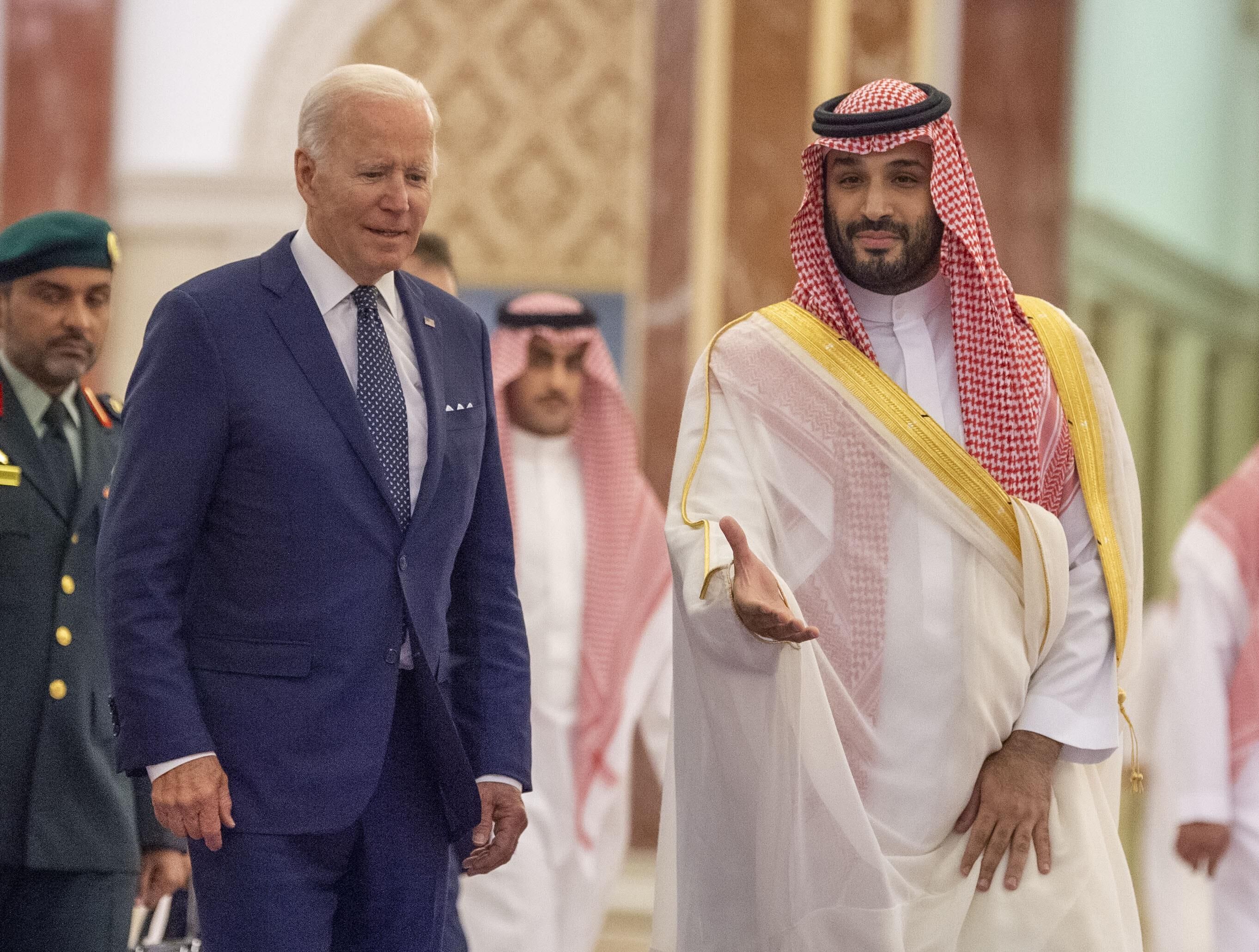
President Joe Biden has a lot of reasons to be furious with his national security team who, against his better judgment, systematically pressured him for 18 months to do an about-face on Saudi Arabia.
The White House has reportedly been in a state of "spasm and panic" since Wednesday, when it became clear that several of the U.S.'s Persian Gulf partners, led by Saudi Arabia and the United Arab Emirates, were set to commit what the White House considered "a hostile act": an extensive cut in oil production coordinated with Russia's Vladimir Putin, which will send oil prices soaring and very likely harm Democrats in the U.S. midterm elections in November.
In response to the American president bending the knee to him (who can forget the infamous fist bump), MBS put a dagger in Biden's back.
Instead of pressing the kingdom to stop undermining U.S. interests, Biden was told to mend fences with Saudi Crown Prince Mohammed bin Salman. In response to the American president bending the knee to him (who can forget the infamous fist bump), MBS put a dagger in Biden's back.
The Saudi-led cut is particularly disastrous because it is far more aggressive than what the members of OPEC+ had been signaling. The impact will not only fall heavily on the U.S. and global economies, but it will also bleed into other areas of geopolitical importance: Higher oil prices could help Russia finance its war on Ukraine and possibly also weaken the resolve of countries supporting Ukraine, particularly European powers.
A distressed White House had little choice but to admit that Saudi Arabia and other U.S. partners in the Persian Gulf were "aligning with Russia."
This is precisely what I, and many other observers of the Middle East, predicted would happen. In June, I wrote: "The most likely outcome of Biden's meeting with the crown prince is that Saudi Arabia and the UAE will pocket Biden's many concessions and offer tactical collaboration against Russia and China in the short run, while keeping their options open to betray Washington down the road."
It appears MBS deliberately provided Biden with a false sense of security by offering a slight increase in oil production in July, only to stab him in the back months later with a massive production cut at a time when Biden was most vulnerable.
The irony is that Biden initially did not want to travel to Saudi Arabia and had no inclination to appease the Saudi dictator. The trip, and the entire idea that appeasing Riyadh was a strategic imperative, shows a clear lack of imagination in U.S. policy when it comes to the Middle East. Brett McGurk, the national security council director for the Middle East explained in November 2021 that Biden aims to bring U.S. foreign policy "back to its basics" in the Middle East rather than rethinking it more fundamentally.
Pulling off the Saudi trip was a "herculean effort," according to one U.S. official, which entailed weekly meetings with national security adviser Jake Sullivan. McGurk also played a crucial role in convincing the president that America had no choice but to embrace the Saudis.
Instead of his advisers, Biden should have listened to the American people.
Throughout it all, it was Biden himself who was reportedly the "biggest hurdle." Even after he had approved the about-face, he publicly remained hesitant and uncomfortable, going as far as to deny that there actually would be a meeting between him and MBS. "I'm not going to meet with MBS," Biden told reporters on June 17. "I'm going to an international meeting. And he's going to be a part of it." Yet once in Saudi Arabia, MBS ended up serving as Biden's escort throughout most of the visit, which must have been embarrassing to Biden.
Biden should have stuck to his instincts. None of the arguments in favor of appeasing the Saudis were convincing. He never had a realistic chance of persuading the Saudis to increase oil production in a meaningful way. Integrating Israel into the Middle East without ending Israel's occupation of Palestinian territories would not stabilize the region. Appeasing MBS would not solidify a delicate cease-fire between Saudi Arabia and Yemen in the long term (the truce collapsed earlier this week). Nor could Biden convince the Saudis and Emiratis to align themselves closer to the U.S. against Russia and China without offering them rock-solid security guarantees, which would run completely counter to U.S. interests.
Instead of his advisers, Biden should have listened to the American people. Fewer than one-quarter of Americans supported the idea of the president going to Saudi Arabia.
In some quarters on Capitol Hill, patience is now running out with Biden's Middle East policy. Several Hill staffers I spoke to Wednesday were furious about this predictable fiasco and expressed support for a shake-up in Biden's national security team. Two lawmakers have already prepared a response; New Jersey Democrat Rep. Tom Malinowski tweeted that "this is a hostile act by Saudi Arabia and the UAE, designed to hurt the United States and our allies and to help Russia, despite President Biden's overtures," adding that he and Rep. Sean Casten will be introducing legislation calling for the U.S. to withdraw our troops from Saudi Arabia and the UAE.
Now, that is advice Biden would be wise to take.
This content originally appeared on Common Dreams - Breaking News & Views for the Progressive Community and was authored by Trita Parsi.
Trita Parsi | Radio Free (2022-10-08T10:00:00+00:00) OPEC’s Slap in the Face Shows Biden Critics Were Right About Meeting With Murderous Saudi Prince. Retrieved from https://www.radiofree.org/2022/10/08/opecs-slap-in-the-face-shows-biden-critics-were-right-about-meeting-with-murderous-saudi-prince/
Please log in to upload a file.
There are no updates yet.
Click the Upload button above to add an update.